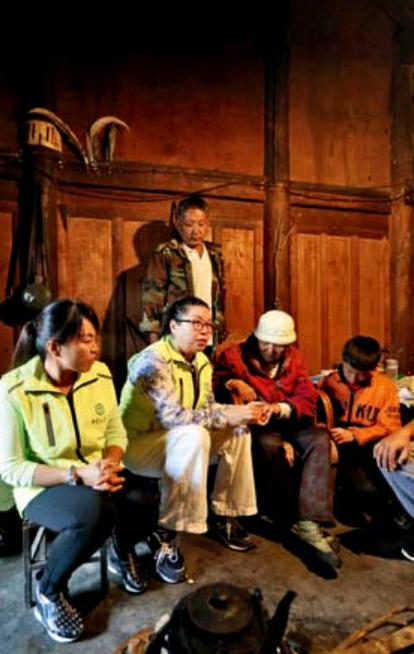Infectious Education
2016-10-25byQiaoZhenqi
by+Qiao+Zhenqi
On a day as gloomy as a dirty rag, clouds shuffle around like bumper cars as the people below wait for one of them to drop rain. Eventually, the rain pelts the roof of an old log cabin before streaming through the trees at the back of the house.
In the dim light, an old woman and her grandson sit around a meager fire.
The boy, Xiao Lei, clings to his grandmother, who can hardly move about. The 11-year-old hasnt seen his parents in years, and doesnt even know they died of AIDS.
His father became infected with HIV through intravenous drug use soon after the boy was born and infected his mother. The couple had no idea about the disease until the late phases because symptoms didnt present and they were never tested. When Lei was two years old, his mother left to work in another city and died three years later. In 2012, his father died too.
Xiao Lei lives in Sudian Township, Yingjiang County of Dehong Dai and Jingpo Autonomous Prefecture in Yunnan Province, a remote mountainous area along the border of China and Myanmar. The geographic location, directly adjacent to the “Golden Triangle” of drug trafficking, has plagued the area with one of the highest HIV infection rates in China. Furthermore, outdated transportation infrastruc- ture and weak information flow always result in poverty and underdevelopment. The popularity of intravenous drug abuse in the region makes it a hotbed for HIV infection, and few locals have access to live-saving medicine after testing positive. Greater numbers of locals are realizing steps that can be taken to fight drug abuse as they are faced with the fact that AIDS still cant be cured. Medicine must be taken regularly to stop HIV from causing AIDS, and once it breaks out, little can be done. And unfortunately Xiao Lei, whose family has been torn apart by drugs and AIDS, is not an isolated case. Thousands of identical situations have emerged across the country.
School Battles
Statistics show that by October 2015, of 575,000 reported cases of HIV infection, 177,000 patients died. Fifteen provinces have reported populations of the infected surpassing 10,000 each.
In 2015, the Joint United Nations Programme on HIV/AIDS (UNAIDS) announced its plan to eliminate AIDS globally by 2030. “Concern about AIDS is only the first step,” asserts Dr. Su Karen, UNAIDS representative in China. “Much needs to be done in terms of prevention.”
This, of course, begs the question:“What can be done in terms of prevention?”
The three most common ways of transmitting HIV are sexual contact, blood contact and mother-to-baby transmission, but data shows that 90 percent is transmitted through sexual contact. It has become clear to activists that better access to reproductive healthcare and sexual education are two of the most effective means of preventing the disease.
For traditional Chinese people, however, sex is a topic never discussed openly, so distributing better information to the public is not an easy task. Today, China has 300 million children and adolescents in school, and 20 million reach sexual maturity every year. However, sex education has never been integrated into the educational system, leaving many completely oblivious to the risks associated with sexual contact: Parents are too shy to talk about it, schools ignore it, and society provides no code of conduct.
Upon fully grasping the urgency of teaching AIDS prevention, Zhang Yinjun and Li Bian quit their well-paid jobs in the media to establish a non-governmental organization, AIDS Prevention Education Project for Chinese Youth (APEPCY), in December 2006. “Schools only supply ABCs,” stress Zhang and Li. “The battle is to provide sexual education that promotes the health of Chinese teenagers and makes them aware of AIDS prevention techniques.”
Space for Dreams
To get their message into schools, APEPCY launched the “Youth Love Cabin” program, which provides a trained educator for each school to disseminate information related to sexual health and AIDS prevention. Alternately, schools can choose an existing teacher to receive systemic training by APEPCY.
Disseminating such knowledge in schools that have never experienced this kind of education is far from an easy task.“The top priority is to convince the school to let us in,” explains Li Bian.
In the early days of the program, most schools refused without hesitation even though APEPCY paid for everything. Both Zhang and Li still remember all the cold shoulders. They considered giving up many times, but ultimately kept at it. Their efforts were all worthwhile.
“In the past, neither parents and students nor teachers had much knowledge about sexual education,” remarks Zhang Yinjun. “People were too shy to talk about anything related to sex, let alone sexually transmitted diseases. Our painstaking efforts over the last few years have made a difference thanks to the establishment of our ‘Youth Love Cabins at schools: Sex is no longer a forbidden topic on campus.”

This year marks the 10th anniversary of the Education Project, which has now yielded very encouraging results. By August, 724 Youth Love Cabins had been established in 48 areas across 21 provinces, municipalities and autonomous regions. Both Zhang and Li have a renewed sense of hope, even though their goal of 10,000 such cabins is still a long way off.
In August 2015, Chinas Ministry of Education and National Health and Family Planning Commission jointly issued a notice on the establishment of a system to report on the epidemic and improve AIDS prevention in schools, underscoring the organic connection between AIDS prevention and sexual education, with focus on sexual morality, responsibility, and avoidance of unprotected sex, topics that are very familiar to APEPCY.
On September 8, 2016, Michel Sidibé, Executive Director of UNAIDS, led a group of officials to visit a Youth Love Cabin in a Ruili high school in Dehong Prefecture, Yunnan. He said that what he saw here increased his confidence about creating a world with zero new HIV infections, zero discrimination and zero AIDSrelated deaths by 2030.